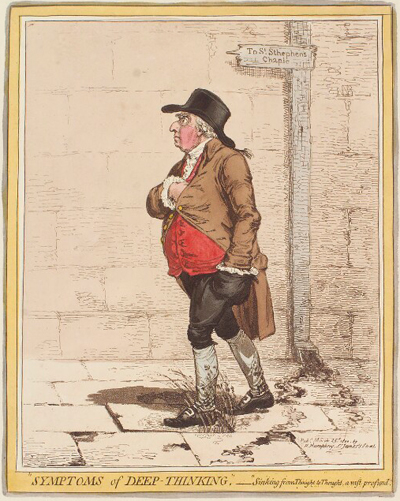Symptoms of Deep Thinking
This is a portrait caricature of Sir Charles Bunbury, the older brother of Henry William Bunbury, the caricaturist. Like most portrait caricatures, the identity of the subject is not specified, but can be derived from the title and details in the portrayal.

© National Portrait Gallery, London
The younger Bunbury was famous for a series of caricatures whose titles began with the words "Symptoms of," including a series on poor horsemanship: Symptoms of Restiveness, Symptoms of Kicking, Symptoms of Rearing, and Symptoms of Starting, as well as a series on meals: The Breakfast. Symptoms of Drowsiness and The Dinner. Symptoms of Eating and Drinking. So the title would suggest a Bunbury. But this Bunbury is on his way to St. Stephens Chapel, the home to the House of Commons until 1834, suggesting that he is not Henry William, the caricaturist, but Sir Charles Bunbury, Member of the House of Commons for Suffolk.
By most accounts, Sir Charles was a kindly and well-meaning soul but, as he is shown here, abstracted, oblivious, and, from Gillray's point of view, stupid. He was married for a time to the great beauty, Lady Sarah Lennox, famously portrayed by Reynolds in his painting, Lady Sarah Bunbury Sacrificing to the Graces, but was apparently unaware or unembarrassed that she was having an affair with Lord William Gordon by whom she had an illegitimate child. It was not until she subsequently eloped with Gordon (taking her child along with her) that Sir Charles sued for divorce.
According to the article on Sir Charles in the History of Parliament, his contributions in the Commons seem to have been few and "insignificant and his attitude incoherent." His rare interventions were not on major issues, but local, humanitarian causes. But even then, his commitment was weak and largely ineffectual. In the weeks before Gillray's print appeared, Bell's Weekly Messenger reported that Sir Charles moved
that the Act of the 36th Geo. II should be read; and, without any preface moved for leave to bring in a Bill to amend and explain the Poor Laws.
This was kindly meant and duly allowed since harvests in 1799 had been meagre. But in an age when speeches in support of a measure could last for hours, there is no evidence of further effort on Sir Charles's part to persuade his colleagues to take action, and, in the end, nothing appears to have been accomplished.
The subtitle of the print is a line from Book One of Alexander Pope's The Dunciad as the Goddess Dulness descends upon Colley Cibber to make him Chief Dunce. Cibber's mind is, of course, a blank.
Swearing and supperless the Hero sate
Blasphem'd his Gods, the Dice, and damn'd his Fate
Then gnaw'd his pen, then dash'd it on the ground,
Sinking from thought to thought, a vast profound!
The implied comparison of Sir Charles with the chief Dunce Cibber may explain the otherwise strange misspellings of two of the four words on the sign above Sir Charles's head.
Sources and Reading
- Commentary from the British Museum on Symptoms of Deep Thinking
- "Thomas Charles Bunbury,," History of Parliament
- "Lady Sarah Lennox" Wikipedia
- Thomas Wright and R.H. Evans, Historical and Descriptive Account of the Caricatures of James Gillray #466
Comments & Corrections
NOTE: Comments and/or corrections are always appreciated. To make that easier, I have included a form below that you can use. I promise never to share any of the info provided without your express permission.